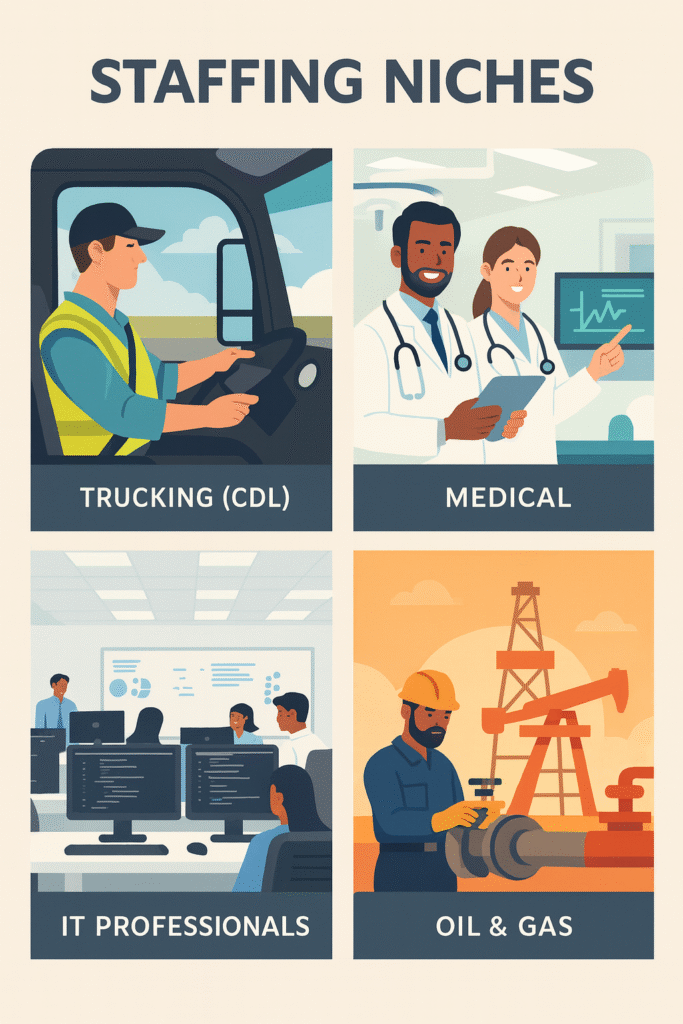Foreword
Texas, a thriving state, showcases a marvelous economy, changing labor sectors, and has a large number of open vacancies as a result of the lack of workforce in almost all sectors of the economy as the demand for skilled workers becomes so high. The reasons are thus employers look at the options of truck drivers helping out in the logistics chain, technicians, healthcare, and IT, plus putting in the right people at times, among other things. If in your thoughts ever come the proposal to open a staffing agency in Texas, the steps entail clear foresight and planning, compliance with the law, and the ability to market. This guide not only acts as an explorer but a navigator, absolutely the complete essential knowledge is right in front of your eyes that you can study in order to establish with successes a company in the staff leasing industry in Texas. When you are brooding on how to start a staffing agency in Texas, you should not forget that the success is based on your understanding of the Texas business regulations, legal requirements, and to comply with state and federal rules.
Start a Staffing Agency in Texas – A Step By Step Guide for Beginners in 2024
Step 1: Formulate Your Business Plan
A business plan is the first thing you need for getting successfully started in any project. Unfortunately, this paperwork is not only the tool you will use to organize your thoughts but also it entails your mission, target markets, fee structures, and revenue projections. A sound financial plan builds confidence in lenders and investors and everyone but yourself knows how to draw the road map of operational processes.
Your plan should include:
- The initial investment plan, covering expenses such as office and computer setup, software solutions, licensing, and startup costs.
- Funding options and the forecasted return on investment.
- A detailed description of your candidate screening process and payroll processing services.
- Techniques for client acquisition, client contract templates, and long-term business growth.
Step 2: Look for Funding
Even if staffing agencies could greatly cut these costs initially, there are still some fundamental operational expenses that they need to prepare for, such as salaries, job board subscriptions, general liability insurance, and rent. An onboarding staffing agency usually seeks funds from resources like small business loans, lines of credit, angel investors, or personal savings accounts.
For instance, a staffing agency in Texas that is looking for truck drivers will have to provide extra working capital to pay the driver wages before they can bill the client. Weighing risks in funding decisions and developing a strong cash flow to cover delays in payment receipts are the key steps. The most effective way to show creditors that you are mindful of your cash flow requirements is to prepare a full revenue forecasting model.

Step 3: Identify Your Niche
As the saying goes, “Everything is bigger in Texas.” This statement also holds true for the various sectors of the economy in different regions of Texas. Getting involved in a specific staffing sector can give you visibility in the market while you obtain in-depth knowledge of that particular area. Some examples could be:
- Trucking and logistics (CDL drivers and dispatchers).
- Oilfield services.
- Healthcare personnel.
- IT contractors.

Choosing a particular niche will enable you to focus your marketing channels, create the necessary client contract templates, and be recognized for the high standard of your placements. This approach will not only make the recruitment process for new staff simpler but also will boost the workers retention rate. Defining niche staffing markets is critical in Texas because competition is high.
Step 4: Formalize Your Business
A business should be treated as an organization. The business registration is first in line. In Texas, you are faced with the choice of deciding the business structure you would like to form (LLC or corporation or sole proprietorship). Each type has its own legal proceedings, tax obligations, and liability coverage.
Once you determine the business entity that fits your operation, the next step is to apply to tell the Texas Secretary of State and draw up your tax ID from the IRS and the Texas Comptroller. It is imperative to be informed about the Texas business regulations, tax registration, and legal requirements Texas has. As long as you obey the state and federal hiring laws, your business will be fine.
Step 5: Acquire Relevant Licenses and Permits
Sheltered employment firms in Texas need to obtain proper employment agency licensing. This type of license ensures that staffing agencies are aware of Texas licensing requirements and it absolves them from the feeling of any irregularity. Depending on your area of expertise, you might also require other special permits.
In this case, using a compliance checklist to look at:
- Federal and state employment law provisions.
- Unemployment tax Texas requirements.
- Subcontracting and vendor management policies.
- Ensuring that the standards of regulatory compliance are all met will not only save you from hefty fines but also protect your business.

Step 6: Establish a Business Location
Even if you operate, by the remote model, Texas law may still call for you to have a registered physical place. The lack of a physical office does not close the door to the world of opportunities for you. Seeing that a professional office is a mark of confidence to clients, it serves as the venue for interviews, training, and sourcing candidates.
For example, if your agency is to work in the trucking industry, it would be an asset to be near the major logistics hubs or interstates. The location of your office is directly related to your operational processes and your strategy for expansion.

Step 7: Choose and Implement Appropriate Business Software
Modern staffing is now leaning fully on technology. You are bound to earn a lot of time and heart as well as cash through the selection of the right software packages, such as:
- Candidate management systems that make the hiring and screening process more efficient.
- Employee payroll management systems that determine tax, and workers’ compensation payments while tracking deductions.
- Client relationship management (CRM) tools that keep track of communication with prospective clients.
The addition of these tools will improve work efficiency, enhance branding, and help you in maintaining a strong service provision.

Step 8: Ensure Insurance and Workers Compensation
In Texas, staffing agencies are generally expected to protect both clients and employees with proper business insurance. This usually includes:
- Workers compensation insurance (especially for high-risk industries like trucking or construction).
- Professional liability and employment law protection.
- General liability insurance.
The moment you procure these business policies, you will not only have the peace of mind that you comply, but also reassure clients that you conduct operations responsibly.
Step 9: Craft a Marketing Strategy
Without clients, even the best agency cannot be expected to make profits. Your marketing campaign has to underline your value offering and the industries you are targeting. The following are some techniques you can apply:
- Creating a solid online presence through SEO, social media networks, and content marketing.
- Participating in industry associations and partnering with local businesses.
- Running ads focused on the employers that would benefit from your employment services.
Good marketing also involves helping clients understand your price structure, service levels, and your process in managing contracts properly. Utilizing different channels to reach your market will not only increase your credibility but will also ensure a consistent influx of clients.

Step 10: Initiate and Strengthen Your Business
It is now time to launch since all has been set right and tight. Initial growth typically stems from referrals and word-of-mouth. You should prioritize the advice that will help you deliver quality employee services, stay compliant with Texas employment laws, and smoothen the candidate placement lifecycle.
As your company moves forward, come back to your business plan, refine processes, and venture into fresh fields. The long-term development of your company is bettered through pathways like partnerships, new contractor systems, and efficient cash-flow management.
Do not forget that the staffing agency and related services in Texas are highly competitive — increase your chances of success by maintaining a steady candidate sourcing, fulfilling your commitment by paying the correct taxes, and meeting or even exceeding the needs of the client.
How To Start a Staffing Agency in Texas (Dallas & Houston) Live with Dee Williams
Conclusion
Starting a staffing agency in Texas is not just about ambition it is also a careful consideration of the Texas licensing requirements, business registration, and regulatory compliance. Besides building a fool-proof business plan and getting workers compensation, every action sets the tone for your company.
Taking the step-by-step guide on how to start a staffing agency in Texas with you, you will be in a good position for your business to succeed. With the right marketing strategies, a focus on niche staffing markets, and a commitment to compliance, your staffing agency startup can even become a trusted partner of Texas employers, whether they are looking for truck drivers, healthcare specialists, or IT personnel.
